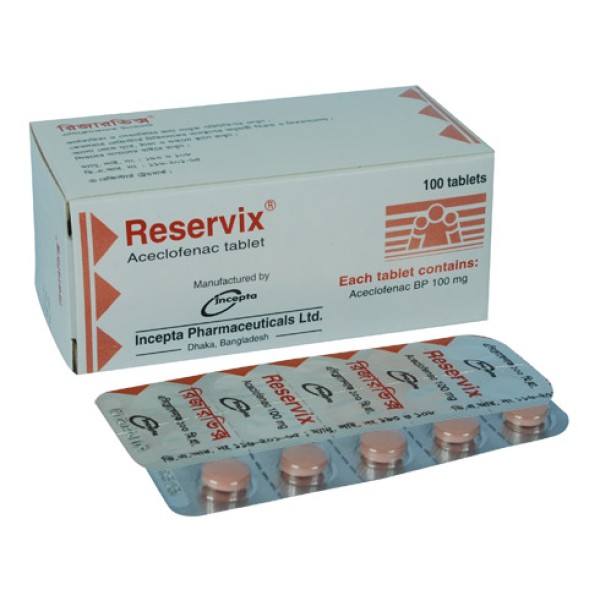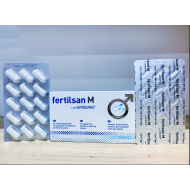
- Stock: In Stock
- Brand: Incepta Pharmaceuticals
- Product ID: Aceclofenac 100 mg Tablet
100% Secure Payment

This Item is for pre order
Reservix Tab
Description
Reservix is a non-steroidal agent with antiinflammatory and analgesic properties. Its mode of action is largely based on inhibition of prostaglandin synthesis. Reservix is a potent inhibitor of the enzyme cyclooxygenase, which is involved in the production of prostaglandins. It also stimulates cartilage matrix (glycosaminoglycans) synthesis.
Indications
Reservix is indicated for the relief of pain and inflammation in both acute and chronic pain like osteoarthritis, rheumatoid arthritis, ankylosing spondylitis, dental pain, post-traumatic pain, low back pain, gynaecological pain etc.
Dosage & Administration
Adults: The maximum recommended dose is 200 mg daily, taken as two separate 100 mg doses, one tablet in the morning and one in the evening.
Children: There is no clinical data on the use of aceclofenac in children.
Elderly: The pharmacokinetics of aceclofenac are not altered in elderly patients, therefore it is not considered necessary to modify the dose and dose frequency.
Renal insufficiency: There is no evidence that the dosage of aceclofenac needs to be modified in patients with mild renal impairment.
Hepatic insufficiency: The dose of aceclofenac should be reduced in patients with hepatic impairment. An initial daily dose of 100 mg should be administered.
Reservix SR tablet:
The recommended dose is 200 mg once daily.
Side Effects
Generally aceclofenac is well tolerated. The majority of side effects observed have been reversible and of a minor nature and include gastrointestinal disorders (dyspepsia, abdominal pain, nausea and diarrhoea) and occasional occurance of dizziness. Dermatological side effects including pruritus and rash. Abnormal hepatic enzyme levels and raised serum creatinine have occasionally been reported.
Precautions
Aceclofenac should be administered with caution to patients with symptoms indicative of gastrointestinal disorders, with a history of peptic ulceration, ulcerative colitis, Crohn\'s disease, hepatic porphyria, and coagulation disorders. Patients suffering from severe hepatic impairment must be monitored.
Use in Pregnancy & Lactation
Pregnancy: There is no information on the use of aceclofenac during pregnancy. Aceclofenac should not be administered during pregnancy, unless there are compelling reasons for doing so. The lowest effective dose should be administered.
Lactation: There is no information on the secretion of aceclofenac in breast milk. The use of aceclofenac should therefore be avoided during lactation unless the potential benefits to the mother outweigh the possible risks to the children.
Over Dose
There is no human data available on the consequences of aceclofenac overdosage. After overdosage, following therapeutic measures to be taken: absorption should be prevented as soon as possible by means of gastric lavage and treatment with activated charcoal. Supportive and symptomatic treatment should be given for complications.

























%20Pvt.%20Ltd./Movicol-Oral-Powder-190x190.jpg)
